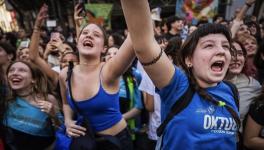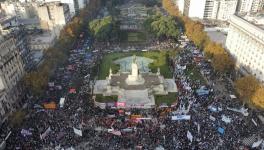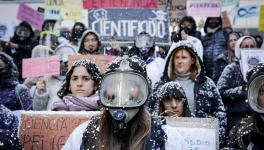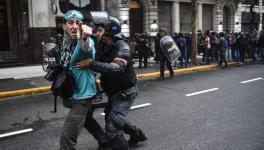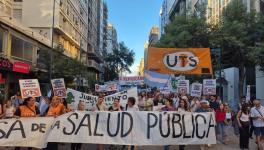Argentina: Former President Cristina Fernández Sentenced to 6 Years in Jail
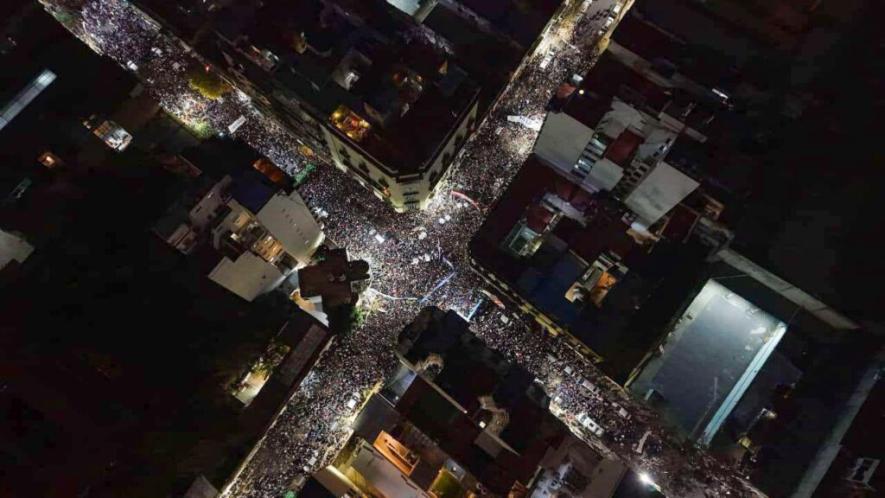
Thousands on the streets outside Cristina Fernández's home in Buenos Aires to show their support. Photo: Argentina Humana
On June 10, the magistrates of the Argentine Supreme Court of Justice (CSJ), Horacio Rosatti, Carlos Rosenkrantz, and Ricardo Lorenzetti ratified a six-year sentence against former president and Peronist leader, Cristina Fernández de Kirchner.
The magistrates also disqualified the Peronist leader from holding public office for the rest of her life. Finally, the Argentine justice system informed the 72-year-old former president that she has five days to turn herself in to the Federal Oral Court.
According to the CSJ, Fernández – a leading opposition figure to the right-wing government of Javier Milei – participated in acts of corruption related to the awarding of 51 public roadworks contracts in the southern province of Santa Cruz. The alleged irregularities occurred during the presidency of Néstor Kirchner (2003-2007) and her own administration that followed (2007-2015).
After hearing the news, thousands of shocked and angry supporters of the Peronist leader took to the streets outside the headquarters of the Justicialist Party and then marched to her house to show their support.
For his part, President Milei posted on X: “Justice. The end.”
Minister of National Security Patricia Bullrich said, “Three instances, hundreds of pieces of evidence, and all the guarantees of due process. There was justice.”
Cristina herself wrote in a post, “Do you think you’re going to solve this by throwing me in jail? Go ahead, throw me in jail. And then what? Will people earn more money? Are you going to raise Argentinians’ salaries? Are you going to fund schools and hospitals? Are you going to pay the debt to the IMF and bondholders?”
Another case of lawfare?
The former president was convicted in the alleged corruption case in 2022. But the ruling had to be upheld by the Supreme Court before the sentence could become final.
In early June, Fernández announced her intention to run for a seat in the legislature of the Buenos Aires Province in the upcoming September 7 elections. It was something of a political comeback, as she had maintained a low profile for over a year, since Javier Milei’s inauguration.
Within a week of her return to the political scene, the Supreme Court decided to review her case June 10 – a date which had not been pre-scheduled before her candidacy announcement. The Court quickly and unanimously ratified her 2022 conviction.
Days before the sentence, Fernández affirmed that the case has nothing to do with any alleged corruption, which she denies, but instead is a political attack through lawfare aimed at preventing her candidacy, isolating Peronism (a significant nationalist and working-class current in Argentine politics) from popular movements, and eliminating any resistance to Milei’s neoliberal project.
“Now, it only took us a week to announce our candidacy for all hell to break loose,” Fernández said in a post on X, accusing the Argentine judicial system of operating like a political party: “Today, coups d’état and the use of the armed forces in the Military Party are no longer necessary. Now it’s the Judicial Party. What they’re planning is how to dismantle the popular and political organization that will emerge.”
In the region more broadly, several progressive Latin American leaders have faced legal persecution for allegedly having committed illegal acts. This includes Lula da Silva (Brazil), Rafael Correa (Ecuador), Pedro Castillo (Peru), and Dina Rousseff (Brazil). However, many of these leaders have denounced that these criminal charges are part of a new type of political persecution that has been implemented throughout the region against leftist leaders called “lawfare”. In many cases, the convictions have been rife with irregularities, and in some the rulings have been overturned.
“Vialidad” case
The “Vialidad” case started in 2008 when several leaders of the opposition to the then Kirchner government denounced alleged acts of corruption between the government and Lázaro Báez’s construction companies.
In 2016, the case regained prominence, and Judge Julián Ercolini indicted Fernández for illicit association and aggravated fraudulent administration. In 2019, the trial went to oral court, and in August 2022, the prosecution requested 12 years of imprisonment for the Peronist leader.
On several occasions during the trial, Kirchner supporters gathered at Fernández’s residence to show their support. On one of those occasions, a man tried to assassinate her, but his gun failed to fire.
Fernández requests house arrest
While the defense of the former president denounced the political persecution of CFK, they also requested that the sentence be served at her home: “We request the house arrest that is given to people who are over 70 years old… We are not asking for privileges, but rather that she be given the same treatment as any other person in the same legal situation.”
In addition, the defense reported that Fernández’s lawyer, Gregorio Dalbon, traveled to The Hague to file a complaint before the International Criminal Court for “political persecution”. In this regard, Dalbon said: “This conviction is the result of a flawed process, directed from its origin to achieve a political objective: to proscribe the woman who won most times at the polls since the democratic recovery.”
Messages of solidarity
In this regard, several of the regions’ leaders have denounced an alleged act of lawfare and have publicly supported the ex-president. Cuban President Miguel Dïaz-Canel said: “We reaffirm our unwavering support for Cristina Fernández in the face of an episode of political judicialization. Once again, justice is used with political motivations as an instrument of the right-wing against progressive leaders in the region. Strength, dear Cristina.”
The President of Bolivia, Luis Arce, also affirmed his support for Fernández: “From Bolivia, we express our firm support and solidarity with sister Cristina Fernández in the face of an evident use of justice as a tool to undermine the forces of the left and the national popular camp. We reaffirm our support for the sovereignty and dignity of the brotherly Argentine people.”
For her part, the Spanish politician, Irene Montero, posted: “Cristina Fernández’s conviction is a coup attempt: a dirty judicial and media war so that, by beating one person, an entire people will renounce a life with rights. They want her imprisoned and out of politics. The democratic forces of the world must find us on their side.”
Social movements and left political parties from across the continent also expressed their solidarity with the historic leader of Peronism in the country.
Courtesy: Peoples Dispatch
Get the latest reports & analysis with people's perspective on Protests, movements & deep analytical videos, discussions of the current affairs in your Telegram app. Subscribe to NewsClick's Telegram channel & get Real-Time updates on stories, as they get published on our website.











